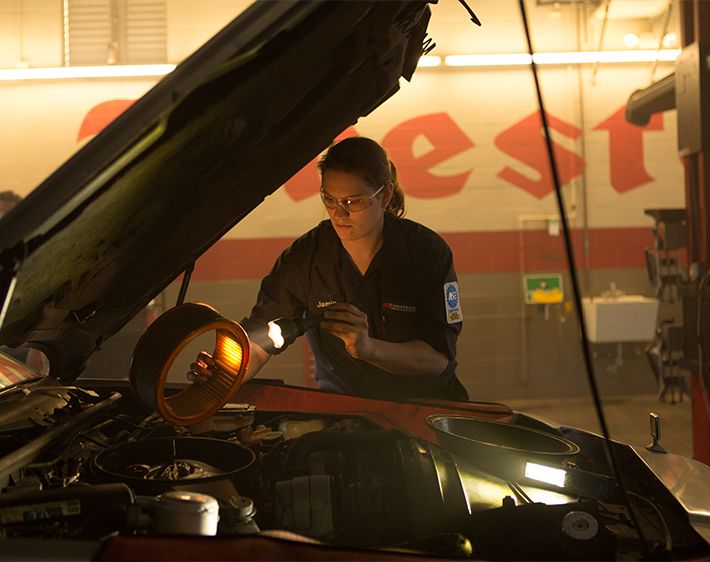Can you and your car handle the heat? Check out seven common ways that summer weather can wreak havoc on your ride, plus how you can avoid these potentially costly car troubles with a little due diligence (and help from your friends at Firestone Complete Auto Care).
#1: Broken A/C
The last thing you need during your commute is your A/C blowing hot air on your freshly shaved face or perfectly curled hair. Even with the windows rolled down, the temperature inside your car can quickly rise to potentially dangerous levels on a hot day, especially if you're stuck in traffic.
When the temperature outside climbs your A/C has to work overtime, so keep an eye on your fluid levels and ensure that your battery and electrical system are in good working order. If you are having trouble with your A/C, make an appointment with us to have an expert check your refrigeration fluid (these fluids are toxic and their disposal is heavily regulated, so it’s best to let professionals handle it).
Pro-tip: Run your errands during cooler parts of the day, such as mornings and evenings, to avoid putting unnecessary strain on your A/C.
#2: Funky Smell
Hotter temperatures might mean more beach days, but they also promote the growth of bacteria and mildew. The best way to keep your car smelling fresh and clean is to quickly remove any wet or damp items, such as bathing suits and towels, and allow the interior of your car to air dry completely (with doors and windows open) when it does get wet.
Is a mildewy smell already making your passengers crinkle their noses? Don’t fret. You can treat mildew damaged upholstery or carpeting with a variety of all-natural solutions, like baking soda and coffee grounds. The Mold Blogger suggests sprinkling the seats and floor with baking soda, letting it sit for a few hours, and then vacuuming it up. Still got an odor problem? Try freshly ground coffee beans. No, it's not time to bring out your french press while driving. Simply place a small open container filled with ground beans and wait. The grounds will absorb any lingering funkiness.
#3: Weak Battery
Heat makes your battery work harder, reducing its lifespan and efficiency. Make sure that all the plastic pieces on the cover of your battery are present and in good condition. These pieces are designed to allow air to pass over the battery while it’s running, keeping it cooler. If you're experiencing a slow engine crank or your battery is looking a little bloated or tubby, stop by your local Firestone Complete Auto Care for a free car battery test. If it performs poorly, search online for a battery that will work for your make and model. Here's a little insider tip too: internet pricing could be cheaper!
Pro-tip: Change your battery every 3-5 years. Old batteries are harder to charge and put extra strain on your alternator/generator, which could lead to serious and costly damage to your electrical system.
#4: Worn Wipers
Summer thunderstorms can get intense. One minute you're enjoying the sunshine, poolside with a nice cold beverage in hand. The next, you're getting pelted with fat, messy drops of rain. When you're driving, worn wipers can quickly lead to unsafe driving conditions if you get caught in one of these thunderstorms.
Check that the edges of your wiper blades are crisp, straight, and intact. Bumps, nicks, or warped edges allow for water and debris to get underneath and cause streaking and even scratching. Manufacturers recommend replacing your wipers every six months. If your windshield looks like a toddler's finger painting when it rains, it's time for an upgrade.
#5: Broken Drive Belt
A broken drive belt (or serpentine belt) can stop you right in your tracks, literally. The serpentine belt powers all of your engine’s accessories and without it, your air conditioning, power steering, and alternator won’t work. Most serpentine belts will last somewhere between 60,000 and 100,000 miles. If it’s been awhile since you’ve changed yours, make an appointment to inspect for damages. Remember: summer heat makes it more likely that a worn drive belt will break. Make sure yours is in good condition before hitting the road in the heat.
#6: Underinflated Tires & Blowouts
Tire problems can cause serious delays on your summer road trip, plus, they're really scary! Hot temperatures during the daytime and cooler temperature at night can mess with your tire pressure and lead to under- or overinflated tires. Underinflated tires are vulnerable to damage, increased wear, and a potential blowout. When the internal components of your tire (the rubber, fabric, steel, etc.) stretch beyond their intended limit like they do when tires are underinflated, they become weak and fail--or POP.
Check your tire pressure before, during, and after any long trip during the summer. To find out what your vehicle's recommended tire pressure is, use this online tire pressure tool. Let's be honest, though. Maybe you're the type of driver who's not likely to pay attention to tire pressure or take the time to check it. If you know that's you (and hey, that's OK!) you may want to look at investing in a set of tires with unique, "run-flat" capabilities. A set of DriveGuard tires, for instance, will allow you to drive up to 50 miles after a flat. They also have high-tech cooling fans that do the work for you, redistributing heat to help prevent blowouts. Both of these amazing features could help make your summer trips safer and more convenient.
#7: Evaporative Leak
In the heat of summer, your gasoline turns into a vapor and increases the pressure in your fuel tank. Excess pressure is relieved through a system of hoses and stored in a holding tank until it can be used by your engine. The hotter it is outside, the more pressure builds up inside. If you have a cracked or leaking hose in your fuel line, vaporized gasoline will escape from the fuel tank, resulting in significantly lowered fuel efficiency.
Even a slight leak in your fuel line will cause the check engine light to turn on. If this happens, first make sure that your fuel cap is on tight. If that doesn’t work and you notice you're burning through fuel faster than usual or there's a gasoline smell hanging around, come in and see one of our auto technicians at Firestone Complete Auto Care.
Think your car may be struggling with one of these hot summer car troubles? Stay cool and schedule a quick appointment at a Firestone Complete Auto Care near you today!



